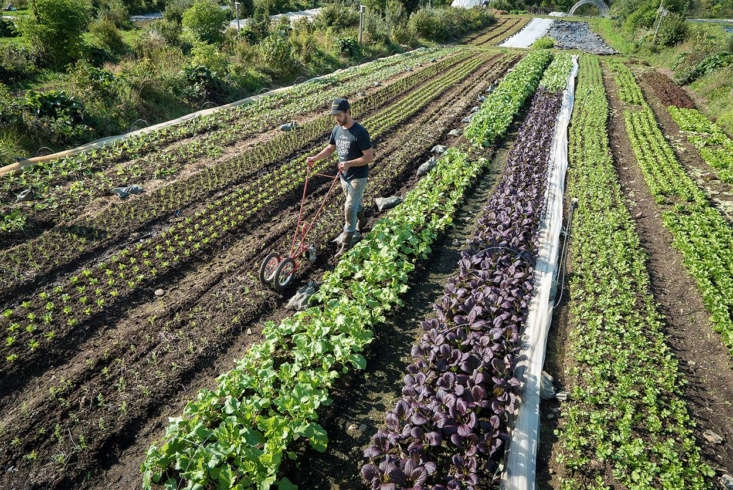If you’ve not already heard of Jean-Martin Fortier, allow us to introduce you to a rising star, the Canadian organic farmer whose notion of human-scaled, “six-figure farming” is shaking up the fields.
Fortier is a busy man: He’s the founder, with wife Maude-Helène Desroches, of Les Jardins de la Grelinette, a 10-acre micro-farm in eastern Quebec where the couple live with their two kids. He’s also at the helm of La Ferme des Quatre-Temps, about an hour away—a social-enterprise experiment to train a new generation of farmers and demonstrate how diversified, small-scale farms can be profitable (while producing highest-quality crops and livestock).
“Profitable” and “six-figure” aren’t terms typically thrown around in discussions of micro-farms, but Fortier does things a little differently. He openly shares that his family farm is profitable, grossing about $100,000 per acre annually (on 1.5 acres of cultivated land)—enough to live well and support his family. He wants people to know that you can make money farming, he tells us, “because, first of all, it’s true. And if we want to attract more young people into the trade, we must let them know that it is possible to make a good living as farmers.”
By “farmers,” he means knowledgeable, efficient stewards of the land. “The goal is to increase production and have more of a life every year,” says Fortier. “Grow better, not bigger, to optimize the cropping system, making it more lucrative and viable in the process.” To share the wealth, Fortier founded The Market Gardener—a set of resources (a book, film, master class, and website) to help both established and would-be farmers increase their organic yields, improve the quality of their produce, and ultimately buy more time for themselves and their families.
Photography by Alex Chabot, courtesy of the Market Gardener.

Les Jardins de la Grelinette provides more than 200 families with vegetables each week through CSA shares, produce baskets, and weekly farmers’ markets. They don’t grow fruit, says Fortier, “because I want to focus on what I am good at and have time to enjoy life.”
Fortier aims to help small farms use “human-scaled” tools that will make their efforts more efficient. Browse his list of recommended Market Gardening Tools for more.

Though Fortier sometimes uses the terms “farmer” and “market gardener” interchangeably, I asked for a definition of the latter: “It’s a scale thing,” he says. “We work in gardens, with no tractors, but we still bring to market what we produce.”


For aspiring farmers and market gardeners, Fortier offers The Market Gardener’s Masterclass, an online course about “applying a model of commercial vegetable production that is designed to care for the land, care for the farmers, and care for the people eating the food.”
The class is not meant for total beginners, says Fortier. Read the class’s FAQ for more detail or Sign Up for Info about the next cohort, which starts in June.





- Think Like a Greengrocer: Rules for Storing Fruits, Vegetables, Dairy, and Meats
- Killiehuntly Farmhouse: An Organic Garden in the Scottish Highlands
- Snug Harbor Farm: Your First Stop in Maine














Have a Question or Comment About This Post?
Join the conversation (0)